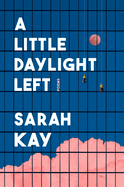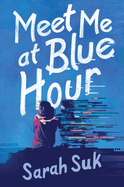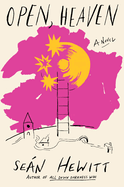
by Sarah Kay
Poet and spoken-word artist Sarah Kay's A Little Daylight Left is an accessible collection that invites readers--even those new to poetry--to fall in love with the form. It launches into the first poem, "A Bird Made of Birds," even before the table of contents. The collection provides its own epigraph, one poem on behalf of them all, saying "Take this fruit./ It is what I have to offer." Kay's poems are meant to be heard, singing off the page and asserting their songs through stylistic choices. These include
Read More »

by Sarah Suk
Canadian Korean author Sarah Suk's Meet Me at Blue Hour is an impressive multilayered story of love, both romantic and familial. Yena, 17, is working as an archive assistant at a pioneering facility for memory erasure, the Sori Clinic in Busan, Korea. Its founding director, Dr. Mira Bae ("a genius, a boss, a trailblazer") is Yena's mother. She "would not have her only daughter graduate from high school with no college plans or future aspirations," so she concocted a job that brought Yena from Vancouver, where
Read More »

by Amy Gerstler
Amy Gerstler's exceptional book of poetry, Is This My Final Form?, leaps from surrealism to elegy as it ponders life's unpredictability.
The language of transformation is integrated throughout. Aging and the seasons are examples of everyday changes. "As Winter Sets In" delivers "every day/ a new face you can't renounce or forsake." "When I was a bird," with its interspecies metamorphoses, introduces a more fantastical concept: "I once observed a scurry of squirrels,/ concealed in a hollow tree, wearing seventeenth/
Read More »

by Robin Walter
In poet Robin Walter's refined debut collection, Little Mercy, nature and language are saving graces.
Many of Walter's poems are as economical as haiku. "Lilies" entrances with its brief lines, alliteration, and sibilance: "Come/ dark, white/ petals// pull/close// --small fists// of night--." A poem's title often leads directly into the text: "Here" continues "the body, yes,/ sometimes// a river--little/ mercy." Vocabulary and imagery reverberate, as the blessings of morning sunshine and a snow-covered meadow
Read More »

by Seán Hewitt
Seán Hewitt's tender first novel, Open, Heaven, is a queer coming-of-age story that questions the assumed evanescence of teenage infatuation.
In 2022, James Legh, a 30-something librarian separated from his husband, returns to his hometown of Thornmere in the North of England to view a farmhouse for sale. He still thinks about his first love, Luke, whom he met on this farm 20 years ago. James has no intention of buying the property; instead, he has come to try to recapture the past and to commune
Read More »

by Emily Jones
Set in the lush forests and coasts of Western Europe around 8,000 years ago, the compelling Nahia offers a glimpse into the chaotic moment when hunter-gatherers were beginning to encounter people who practiced agriculture and introduces readers to a fierce and intuitive girl coming of age within this framework.
Nahia, as firstborn daughter of the headwoman of the Sea People, can't understand why her mother is ignoring the ominous signs that it's time to move her people inland to safety. Bands down the coast
Read More »



























